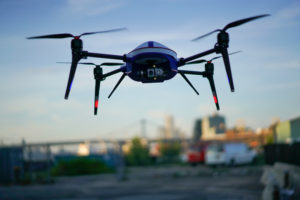



image: Easy Aerial
infiniDome Robust Navigation System Completes Field Demonstration: Accurate navigation in GNSS-Denied environments
by DRONELIFE Staff Writer Ian M. Crosby
The GPS Security Company infiniDome has teamed with Honeywell Aerospace and Easy Aerial in demonstrating the first UAV-tailored , Robust Navigation System. With the integration of GPS anti-jamming technology, Radar Velocity System and Inertial Navigation System, the system enables UAVs to operate safely and effectively, even in GPS challenged or fully denied environments.
Unmanned Aerial Vehicles (UAVs) are increasingly being used in place of manned vehicles. However, UAVs are almost entirely reliant on GNSS (Global Navigation Satellite System) for the most basic of functionality required for navigation, especially for BVLOS (Beyond Visual Line Of Sight) and autonomous operations.
The weak and vulnerable nature of the GNSS signal renders it heavily vulnerable against jamming attacks, which can be carried out from large distances using a simple jammer purchased online.
Developers currently try to address this problem either by creating “safe landing protocols” in GNSS-challenged environments or by adding various types of sensors to their flight controllers which, in some scenarios, provide a reasonable source of positioning data. However, they fail to work in many situations such as when flying at certain altitudes or high speeds, in fog or darkness, above sea and other such scenarios. The Robust Navigation System, jointly developed by Honeywell and infiniDome, aims to solve this problem.
By pairing the GNSS-based UAV-tailored Honeywell’s Compact Inertial Navigation System (HCINS) with infiniDome’s GNSS anti-jamming technology (GPSdome), integrated with Honeywell’s Radar-based Velocity System (HRVS), the Robust Navigation System is a comprehensive solution that can be installed on nearly any UAV, granting it continuous, accurate navigation data in GNSS-challenged or fully GNSS-denied environments.
The Robust Navigation System, installed on a customized version of the Osprey Hexa-copter, underwent a demonstration in Israel against 2 military-grade directional jammers in order to prove the System’s capabilities in maintaining autonomous navigation operation for multi-copters under different GPS/GNSS jamming scenarios. The demonstration was attended by Israeli defence chiefs, as well as various drone and UAV companies and government end-users.
Regular, unprotected UAV, when faced with military-grade jammers, lose GNSS accuracy within 3-5 seconds, requiring the operator to assume manual control to avoid crashing.
With the protection of the Robust Navigation System solution, the UAV completed all planned tests and demonstrated that in GNSS-challenged and fully GNSS-denied environments, the UAV is not only able to safely land or return home, but also carry out its BVLOS / Autonomous mission.
Read more about Easy Aerial, BVLOS flight,

 Ian attended Dominican University of California, where he received a BA in English in 2019. With a lifelong passion for writing and storytelling and a keen interest in technology, he is now contributing to DroneLife as a staff writer.
Ian attended Dominican University of California, where he received a BA in English in 2019. With a lifelong passion for writing and storytelling and a keen interest in technology, he is now contributing to DroneLife as a staff writer.
Miriam McNabb is the Editor-in-Chief of DRONELIFE and CEO of JobForDrones, a professional drone services marketplace, and a fascinated observer of the emerging drone industry and the regulatory environment for drones. Miriam has penned over 3,000 articles focused on the commercial drone space and is an international speaker and recognized figure in the industry. Miriam has a degree from the University of Chicago and over 20 years of experience in high tech sales and marketing for new technologies.
For drone industry consulting or writing, Email Miriam.
TWITTER:@spaldingbarker
Subscribe to DroneLife here.





Related Posts
Windracers ULTRA Achieves 2,000km Range with Heavy-Lift Payload Capability
Walmart and Wing Launch Major Drone Delivery Expansion from Houston
Antigravity A1: World’s First 8K 360 Drone Now Available